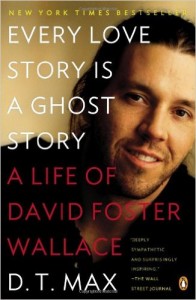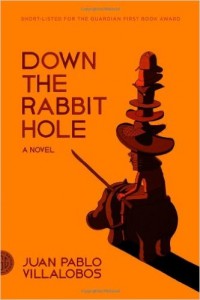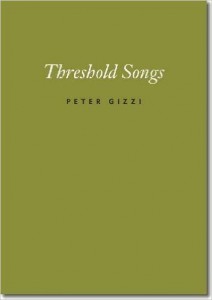Book Reviews, 12/2012
D.T. Max | Every Love Story is a Ghost Story
Viking, 2012
by Sally Franson
 One has a sinking feeling when sitting down to read Every Love Story is a Ghost Story, D.T. Max’s biography of David Foster Wallace, that Wallace himself would have decidedly mixed feelings about its publication. On the one hand, the MacArthur genius-slash-most beloved writer of his generation [1] was ferociously ambitious and competitive, as eager to be recognized by the red eye of Sauron (as he called the New York literary scene) as he was to abjure it. When he first read Jonathan Franzen, with whom he had an intense and occasionally combative friendship, he admitted to “hugging criticisms [of Franzen’s debut novel] to myself in unabashed self-defense.” He was a writer who loved to be loved, a writer aware of his moral-giant-esque-presence in the public sphere, a writer who, by committing suicide in 2008, as Franzen reflected in the New Yorker, “had chosen the adulation of strangers over the love of people closest to him.” And the majority of lit bio readers, especially readers of this one, will be as adulatory as any group of people can be.
One has a sinking feeling when sitting down to read Every Love Story is a Ghost Story, D.T. Max’s biography of David Foster Wallace, that Wallace himself would have decidedly mixed feelings about its publication. On the one hand, the MacArthur genius-slash-most beloved writer of his generation [1] was ferociously ambitious and competitive, as eager to be recognized by the red eye of Sauron (as he called the New York literary scene) as he was to abjure it. When he first read Jonathan Franzen, with whom he had an intense and occasionally combative friendship, he admitted to “hugging criticisms [of Franzen’s debut novel] to myself in unabashed self-defense.” He was a writer who loved to be loved, a writer aware of his moral-giant-esque-presence in the public sphere, a writer who, by committing suicide in 2008, as Franzen reflected in the New Yorker, “had chosen the adulation of strangers over the love of people closest to him.” And the majority of lit bio readers, especially readers of this one, will be as adulatory as any group of people can be.
On the other hand, as Wallace argued in a scathing review of Edwin Williamson’s Borges: A Life, examining an author’s work through “the personal and/or psychological circumstances surrounding its creation” is succumbing to the intentional fallacy; it distorts both the reading of the text and the essence of the author himself. But reductive psychological criticism is generally in the literary biographer’s best interest; otherwise, what’s the point of his carefully crafted, minute exposures? For an author who took such pains as Wallace did to shield his substance abuse and mental illness from the general public, [2] this unflinching, often devastating account of his numerous personal breakdowns and eventual suicide has the potential to be read as an act of betrayal. The warm, big-hearted and wise Wallace of the page is complicated by the messy, jealous, and all-too-human Wallace that walked the earth. Wallace was both flesh and not, just as he wrote of Roger Federer. And it was the flesh that undid him, just as it eventually, in its cruel, idiosyncratic ways, will all of us.
The fragility of Wallace’s flesh is the thru-line of this book, and luckily for Wallace’s legacy, Max is an elegant and surprisingly objective biographer, often letting Wallace speak for himself when it comes to matters of the head and heart. [3] If it is implied that Wallace’s mother was the primary source of his suffering, it is because Wallace himself declares it, not because Max does a forced reading of stories like “Self-Harm as a Sort of Offering.” He did a lot of therapy with the encouragement of Mary Karr [4] in addition to his addiction recovery and was an avid reader of self-help books; he was as dependent as any other American on the promise of catharsis. But the complexities of the mother-son relationship are never fully revealed or resolved in the bio; in fact, near the end of his life, Wallace told his wife “he had no idea what had made him so mad at his family in his thirties.” This evaporation of anger without even a whiff of epiphany feels right; it feels human. Max’s tracking of the mother-son dynamics is just one example of what makes his biography ultimately so successful: he allows Wallace’s inconsistencies and contradictions to stand for themselves, without needing to explain or construct a narrative around them.
While only a slim chapter is devoted to Wallace’s final years in California, his suicide casts a funereal pall over the previous 270 pages. Max implies that Wallace’s inability to finish The Pale King, and his struggles with fiction writ large, had a significant role in his precipitous decline. “When I say the novel is a killer,” Don DeLillo wrote to Wallace in 1996, “I am reserving this designation for writers who are smart enough, sensitive enough, and good enough to realize the dangers and consequently to respect the form.” Wallace knew the dangers, and he knew, too, as Max writes, “the danger of a mind unhinged, of the danger of thinking responsive only to itself.” Yet knowing alone is not a preventative measure. When Wallace chose to go off the antidepressant that had helped to stabilize him for two decades, it was partly egotism, the distorted belief that the drug was holding him back from writing good fiction. “The person who would go off the medications that were possibly keeping him alive was not the person he liked,” his widow, Karen Green, reflects.
During his now-famous Kenyon College commencement address, [5] Wallace warned graduates of such egotism. In a tone similar to some of his notes for The Pale King, [6] he explained that even in such boring places like a supermarket line they could open themselves up to beauty “on fire with the same force that lit the starts—compassion, love, the subsurface unity of all things.” Thus it is painful to imagine that boredom, the subject of The Pale King, or the inability to choose a different way to interact with challenging circumstances, was ultimately what killed Wallace. But it is a testament to Max’s artistry as a biographer that at the end we grieve both the flesh and the not—the human and the moral giant, the man of the real world and the man of his brilliant, fictive own.
1. The sheer number of superlatives attached to Wallace’s name is beyond the purview of this review, but just in case it’s not clear: his readers (including yours truly) adored him.↩
2. For example, in his essay on 9/11, “The View from Mrs. Thompson’s,” Wallace substitutes “church congregation” for what was actually his AA group. ↩
3. Wallace wrote prolific letters in the vein of Virginia Woolf, maintaining correspondence with Franzen, Don DeLillo, and David Markson, among many, many others. They’re so good and so fascinating that one almost wishes that the book were made up solely of this primary source material. Although since three books worth of Wallace’s material have already come out posthumously, no doubt a “collected letters” is already in the works.↩
4. The, ahem, dysfunctional nature of the Karr/Wallace relationship (think stalking, think plan involving guns) has gotten a lot of play in reviews of this biography, probably because periods of relative stability in Wallace’s life aren’t as likely to draw headlines, but really it appears to be a rather short era in Wallace’s life. ↩
5. Which has a quarter of a million hits on YouTube and has since been made into a book (This is Water)↩
6. “Bliss—a second-by-second joy and gratitude at the gift of being alive, conscious – lies on the other side of crushing, crushing boredom. Pay close attention to the most tedious thing you can find (Tax Returns, Televised Golf) and, in waves, a boredom like you’ve never known will wash over you and just about kill you. Ride these out, and it’s like stepping from black and white into color. Like water after days in the desert. Instant bliss in every atom.”↩
Juan Pablo Villalobos | Down the Rabbit Hole
FSG, 2012
by Brian Gebhart
 Certain subjects are hazardous for fiction writers because of how thoroughly reality has cornered the market. Take kidnapping, for instance. From the Lindbergh baby to Elizabeth Smart, the Taliban to Jaycee Lee Dugard, there’s not much space left for one’s imagination to work. And while there are a few worthy fictional accounts—Fargo springs to mind, and I guess Lolita should count—the vast majority veer into cliché and melodrama. For a novelist, the challenge is to escape the constraints of the typical storylines while still offering a compelling narrative. In the acclaimed novel Room, Emma Donaghue employs a child narrator to circumvent this dilemma, telling the story from the perspective of a boy born and raised in captivity, who doesn’t understand any reality outside the room where he lives. We learn about his world and its history by tracking his thought process, down to his vocabulary, and this provides the reader a wholly unexpected and engrossing point of view.
Certain subjects are hazardous for fiction writers because of how thoroughly reality has cornered the market. Take kidnapping, for instance. From the Lindbergh baby to Elizabeth Smart, the Taliban to Jaycee Lee Dugard, there’s not much space left for one’s imagination to work. And while there are a few worthy fictional accounts—Fargo springs to mind, and I guess Lolita should count—the vast majority veer into cliché and melodrama. For a novelist, the challenge is to escape the constraints of the typical storylines while still offering a compelling narrative. In the acclaimed novel Room, Emma Donaghue employs a child narrator to circumvent this dilemma, telling the story from the perspective of a boy born and raised in captivity, who doesn’t understand any reality outside the room where he lives. We learn about his world and its history by tracking his thought process, down to his vocabulary, and this provides the reader a wholly unexpected and engrossing point of view.
Juan Pablo Villalobos faces a similar quandary in his short, gripping debut novel, Down the Rabbit Hole (published in Spain in 2010, with FSG putting out the first American edition earlier this year) because “cartel” is another one of those words that comes with a preexisting set of storylines, from both news and pop culture. So Villalobos wisely avoids tackling the subject head-on. Instead, he gives us Tochtli, a boy who lives in a remote palace somewhere in southern Mexico with his father, Yolcaut, his tutor, Mazatzin, and a handful of guards and servants. Like Jack, the child narrator of Room, the words Tochtli uses and the way he tells his story are revealing. He introduces himself this way: “Some people say I’m precocious. They say it mainly because they think I know difficult words for a little boy. Some of the difficult words I know are: sordid, disastrous, immaculate, pathetic, and devastating. There aren’t really that many people who say I’m precocious. The problem is I don’t know that many people. I know maybe thirteen or fourteen people, and four of them say I’m precocious.” Tochtli (whose name in Nahuatl means “rabbit,” according to translator Rosalind Harvey’s helpful glossary) tells us quite a bit about the limits of his world while also giving us a few verbal touchstones to help illustrate it. He returns proudly to these words throughout the novel, their use (and misuse) always evocative even—perhaps especially—when not literally correct.
So yes, Tochtli is an unusual kid, but his interests are not so different from those that might fascinate any other boy: animals, samurai movies, an extensive hat collection, guns and violence. The differences arise in the way these preoccupations actually materialize in his daily life. An ordinary kid might have a hat collection, but how many kids have a menagerie of exotic animals on the grounds of their father’s estate, including tigers and eagles and lions? More to the point, how many would shrug at the tigers because the only animal they truly want is a Liberian pygmy hippopotamus? Similarly, lots of boys are intrigued by murder and gunplay, but for the vast majority of them, these remain imaginative fixations. In Tochtli’s world, however, they intrude into reality. Or as Yolcaut tells his son at one point, “Realists are people who think reality isn’t how you think it is.”
When violence elbows its way into Tochtli’s life, we learn a great deal more about his world: “The other day a man I didn’t know came to our palace and Yolcaut wanted to know if I was macho or not. The man’s face was covered in blood and, the truth is, I was a bit scared when I saw him. But I didn’t say anything, because being macho means you’re not scared…I stood there very solemnly while Miztli and Chichilkuali, who are the guards in our palace, gave him some devastating blows.” After he’s allowed to leave, he remains remarkably unfazed by the experience. In fact, he spends the next two pages idly ruminating on the best ways of “making corpses,” weighing the merits of guns, knives, and guillotines, before finally settling on decapitation. “If we didn’t have a neck it would be different. It might be normal to cut bodies in half down the middle so as to have two corpses. But we have a neck and this is a really big temptation. Especially for French people.” No surprise, then, that the names Tochtli dreams up for his hippopotamuses are Louis XVI and Marie Antoinette.
Most children have active imaginations, but in Tochtli’s world, the strong can craft reality to suit their purpose. When a magazine publishes an article revealing secrets about the family business, Tochtli remarks, “I used to think the only thing you could kidnap was people. Well it turns out it’s not, you can kidnap other things too, like magazines…Miztli says that Chichilkuali went to a factory where they do recycling: all the magazines will be put in a machine and the machine will turn them into paper for wrapping tortillas in.” As Yolcaut’s mania and paranoia leads toward ever more sordid and disastrous outcomes, Down the Rabbit Hole grows both darker and funnier, gaining a bleakly hilarious energy. By the end, I began to think a more literal translation of Villalobos’s title would have better suited the novel. The Spanish title is Fiesta en la madriguera, or Party in the Warren.
Peter Gizzi | Threshold Songs
Wesleyan University Press, 2011
by Jeff Simpson
 I’ve started four different versions of this review, and in the end I decided I mostly want to tell you two things: One, no one writing today writes like Peter Gizzi. Though he’s often labeled an “experimental poet,” I’ve always considered him one of the few contemporary writers who can combine the New York School tradition with a style that feels immediate, important, and gratifyingly accessible. Two, as much as I love this book—and I do love it—I still have to rank Threshold Songs (Gizzi’s fifth) his third best collection behind The Outernationale (Wesleyan, 2007) and Some Values of Landscape and Weather (Wesleyan, 2003).
I’ve started four different versions of this review, and in the end I decided I mostly want to tell you two things: One, no one writing today writes like Peter Gizzi. Though he’s often labeled an “experimental poet,” I’ve always considered him one of the few contemporary writers who can combine the New York School tradition with a style that feels immediate, important, and gratifyingly accessible. Two, as much as I love this book—and I do love it—I still have to rank Threshold Songs (Gizzi’s fifth) his third best collection behind The Outernationale (Wesleyan, 2007) and Some Values of Landscape and Weather (Wesleyan, 2003).
There is a spike
in the air
a distant thrum
you call singing
and how many nights
this giganto, torn
tuned, I wonder if
you hear me
I mean I talk
to myself through you
Seen as a treatise on grief, Gizzi’s search for meaning through the failings of the pastoral world and his struggle to trace the postmodern lyric back to its romantic origin is gripping not for what it achieves, but precisely for what it cannot. Threshold Songs looks closely at the zones and boundaries we run into looking for departure—our Whitmanian desire for union and rescue from loss—and finds neither beauty nor solace in the song itself, but only uncertainty:
Is there an end
to plastic. Is
yesterday the new
tomorrow. And
is that a future?
Do we get to
touch it and be
content here
before we go.
In doing so, Gizzi has created something extraordinarily raw and open: “And if I say the words / will you know them? / Is there world? / Are they still calling it that?” Just as Threshold Songs is stripped of ornate poeticizing, this collection will strip you bear with its beauty and grief. There’s not another poet, living or dead, whose third best book I can’t stop talking about.
